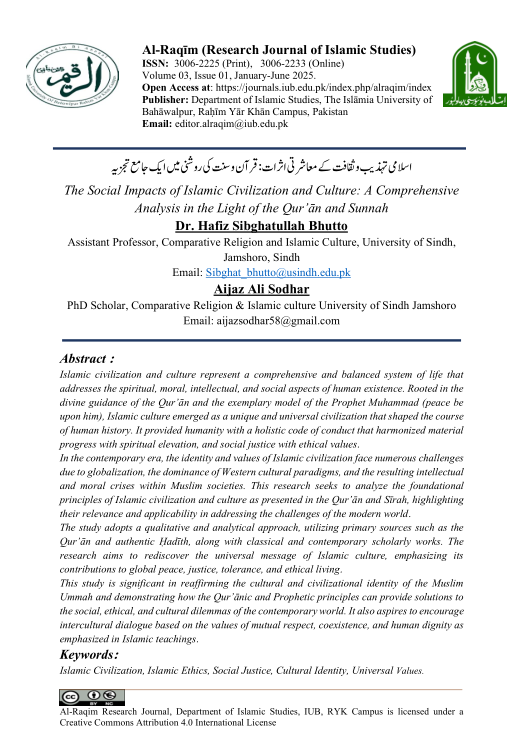اسلامی تہذیب و ثقافت کے معاشرتی اثرات: قرآن و سنت کی روشنی میں ایک جامع تجزیہ
The Social Impacts of Islamic Civilization and Culture: A Comprehensive Analysis in the Light of the Qur’ān and Sunnah
Keywords:
Islamic Civilization, Islamic Ethics, Social Justice, Cultural Identity, Universal ValuesAbstract
Islamic civilization and culture represent a comprehensive and balanced system of life that addresses the spiritual, moral, intellectual, and social aspects of human existence. Rooted in the divine guidance of the Qur’ān and the exemplary model of the Prophet Muhammad (peace be upon him), Islamic culture emerged as a unique and universal civilization that shaped the course of human history. It provided humanity with a holistic code of conduct that harmonized material progress with spiritual elevation, and social justice with ethical values. In the contemporary era, the identity and values of Islamic civilization face numerous challenges due to globalization, the dominance of Western cultural paradigms, and the resulting intellectual and moral crises within Muslim societies. This research seeks to analyze the foundational principles of Islamic civilization and culture as presented in the Qur’ān and Sīrah, highlighting their relevance and applicability in addressing the challenges of the modern world.
The study adopts a qualitative and analytical approach, utilizing primary sources such as the Qur’ān and authentic Ḥadīth, along with classical and contemporary scholarly works. The research aims to rediscover the universal message of Islamic culture, emphasizing its contributions to global peace, justice, tolerance, and ethical living.
This study is significant in reaffirming the cultural and civilizational identity of the Muslim Ummah and demonstrating how the Qur’ānic and Prophetic principles can provide solutions to the social, ethical, and cultural dilemmas of the contemporary world. It also aspires to encourage intercultural dialogue based on the values of mutual respect, coexistence, and human dignity as emphasized in Islamic teachings.

Downloads
Published
Issue
Section
License
Copyright (c) 2025 Dr. Hafiz Sibghatullah Bhutto, Aijaz Ali Sodhar

This work is licensed under a Creative Commons Attribution-NonCommercial 4.0 International License.




